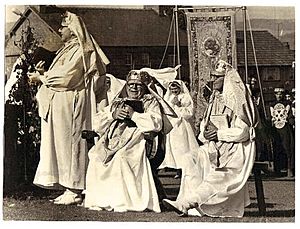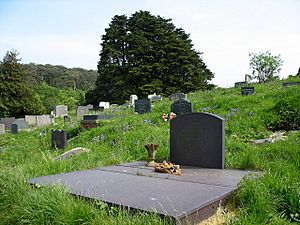Albert Evans-Jones facts for kids
Sir (Albert) Cynan Evans-Jones CBE (born April 14, 1895 – died January 26, 1970) was a famous Welsh poet and writer. He was known in Wales by his special bardic name, Cynan. He wrote many poems, especially about war, and also plays.
Contents
Early Life
Cynan was born in Pwllheli and his birth name was Albert Evan Jones. His father owned a restaurant there. Cynan went to Pwllheli Grammar School. He then studied at the University College of North Wales in Bangor. He finished his studies in 1916.
First World War
After university, Cynan joined the Welsh Student Company of the RAMC. He served in places like Salonika and France. He started as an ambulance man. Later, he became the company's military chaplain, which is like a minister for soldiers.
His time in the war deeply affected his poems. Some people, like Alan Llwyd, believe Cynan was the most important Welsh war poet of the First World War. Another poet, Hedd Wyn, wrote war poems before joining the army. He died before he could share his war experiences. But Cynan's poems describe the difficult and harsh parts of war. They show how war affected both a person's body and their feelings.
Post-war Career
After the war, Cynan went to college in Pwllheli. He trained to become a minister for the Presbyterian Church of Wales. He became a minister in Penmaenmawr in 1920. He worked there until 1931.
Then, he started a new job at the University College of North Wales. He taught drama and Welsh literature. Even though he stopped being a full-time minister, Cynan still preached often. He was a very popular speaker in Wales.
While working at the university, Cynan lived in Menai Bridge, Anglesey. But in one of his most famous poems, he wrote about wanting to retire to Aberdaron. He imagined a quiet life there.
|
Pan fwyf yn hen a pharchus |
When I am old and respected |
| —Translated by Robin ap Cynan |
Drama
Cynan was important not only for his poetry but also for Welsh plays. He wrote two full-length plays. His play Hywel Harris won a top prize at the Eisteddfod in 1931. He also wrote Absolom Fy Mab for the National Eisteddfod in 1957. This play was highly praised. He also translated English plays into Welsh. These included Good Friday by John Masefield and The Old Man of the Mountain by Norman Nicholson.
In 1931, Cynan became an official who checked Welsh plays for the government. He held this job until 1968. He was known for being fair. For example, he allowed James Kitchener Davies' play Cwm Glo to be performed. This play was a bit controversial but won a prize in 1934.
Cynan often appeared on Welsh radio and TV shows. He was even the subject of the first color TV program broadcast in Welsh. It was called Llanc o Lŷn.
National Eisteddfod
Cynan is perhaps best known for his big role in modernizing the National Eisteddfod. The Eisteddfod is a major festival of Welsh culture, music, and poetry. He was chosen as the Archdruid twice. This is a very important leadership role at the Eisteddfod. He is the only person to have been Archdruid for two terms. His first term was from 1950 to 1954. His second was from 1963 to 1966. He also held other important positions within the Eisteddfod organization.
Cynan was the first Archdruid to agree that the Gorsedd (a group of bards at the Eisteddfod) was created in the 1700s. He said it had no real links to ancient Welsh myths or old Druids. This helped bring together different groups who had disagreed about the Eisteddfod's history.
Cynan also designed the modern ceremonies for the Crowning and the Chairing of the Bard. These are important parts of the Eisteddfod today. He created ceremonies that he felt better showed the Christian beliefs of the Welsh people.
Cynan was also a successful competitor at the National Eisteddfod. He won the Bardic Crown three times.
- In 1921, he won at the Caernarfon Eisteddfod for his poem Mab y Bwthyn ("A Cottage Son"). This poem was about his experiences in the First World War.
- He won the Crown again in 1923 at the Mold Eisteddfod for Yr Ynys Unig ("The Lonely Isle").
- His third crowned poem was Y Dyrfa / The Crowd in 1931. This poem described a rugby match. It was the first time such a topic was used in Welsh poetry.
Besides his three Crowns, Cynan also won the Bardic Chair in 1924. This was for his poem I'r Duw nid adwaenir ("To the Unknown God"). This was special because it was the only time the Chair was given for a poem that didn't follow the usual strict rules of Welsh poetry.
Cynan also served as a judge many times at the National Eisteddfod.
Honours
Cynan received an honorary degree called D.Litt from the University of Wales in 1961.
He was also given the freedom of the town of Pwllheli in 1963.
He was appointed CBE in 1949. In 1969, he was made a Knight Bachelor, which means he was given the title "Sir."
Marriage
Cynan was married twice. His first wife was Ellen J. Jones from Pwllheli. They married in 1921 and had one son and one daughter. Ellen passed away in 1962. In 1963, he married Menna Meirion Jones from Valley, Anglesey.
Death and Burial
Cynan died on January 26, 1970. He was buried in the churchyard of St Tysilio's Church, Menai Bridge. This church is on Church Island, near the Menai Strait in Anglesey.
Works
Poetry
- Telyn y Nos (1921)
- Caniadau (1927)
Plays
- Hywel Harris (1932)
- Hen Ŵr y Mynydd (Translation, 1949)
- Absalom Fy Mab (1957)
Novels
- Ffarwel Weledig (1946)
 | Leon Lynch |
 | Milton P. Webster |
 | Ferdinand Smith |



